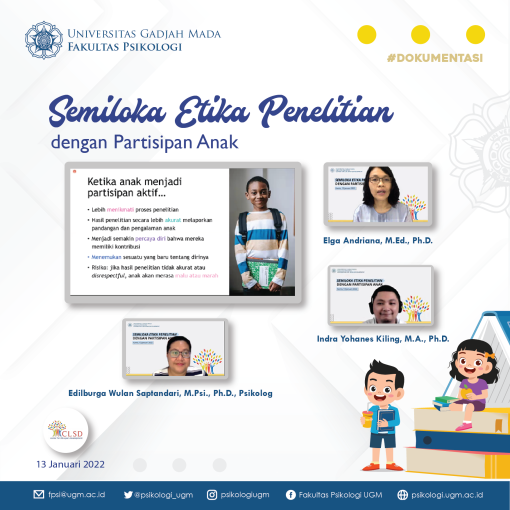
Thursday (13/1) Center for Life-span Development (CLSD) UGM held a Research Ethics Workshop with Child Participants. This event discusses the dynamics of research with child participants in various contexts. The event is held online by bringing in expert speakers who are experienced in conducting research with children.
This event will be held from 8.00 AM until 0.30 PM. The event was attended by 70 participants.
The speakers in the first session were Edilburga Wulan Saptandari, M.Psi., Ph.D., Psychologist, Head of the UGM Psychology Doctoral Study Program. On this occasion, Edilburga gave a presentation with the title Methodological and Ethical Challenges for Research with Children. The topics discussed in his presentation ranged from reasons why researchers chose not to involve children to tips on how to conduct research with children.
The long history of research ethics was also an important point in the presentation in this first session. Edilburga tells about the beginning of its use in the medical field. The use of strict ethical standards that are able to minimize the risk of research participants is finally adopted by researchers in the social humanities field.
“When there is harm, there is danger, it is not only because of something that enters the body, but there is an aspect of the power relationship between the researcher and the participant. Well, here, of course, we can handle it later with the methodology and ethical steps,” explained Edilburga while explaining how researchers must have a good mindset during research and not look down on participants.
The next session in this event was filled by Elga Andriana, S.Psi., M.Ed., Ph.D, Head of UGM International Undergraduate Program (IUP) and Head of UGM Center for Life-span Development (CLSD). Elga gave a presentation with the research title Melibatkan Anak yang Etis dan Inklusif. In this presentation, Elga invited the workshop participants to recognize the types of disabilities, to adapt research tools and informed consent.
In the context of research, researchers have different approaches to disability. Elga explained that there are at least three commonly used approaches, namely the Medical Model of Disability, Social Model of Disability, and The International Classification of Disability, Functioning, and Health.
“The first and perhaps the most widely used, especially in the Indonesian context, is the medical model of disability. So this model adheres to the understanding that the inability or inhibition comes from the individual,” explained Elga while pointing out that research using this approach leads to improvements in aspects that are not developing properly.
In the last session of the presentation, Indra Yohanes Kiling, M.A., Ph.D., Assistant Professor of Psychology, Faculty of Public Health, Nusa Cendana University, Kupang. Indra gave a presentation entitled Ethics and Child Vulnerability at the Indonesian Border. In addition to explaining the demographic and socio-cultural conditions of the border areas that researchers need to pay attention to when conducting research, Indra also highlighted the lack of awareness of psychology researchers who involve humans to conduct research ethical reviews.
Furthermore, Indra also explained to the workshop participants that when conducting research, one must look at the relationship between adults and children. This is important to get the perspective of the child better and not distorted by the perspective of the adult.
“At the border or other developing areas, for example with relations with children, adults are stronger. (It) makes the perspective (of) this child forgotten, “explained Indra.
The event, which lasted for almost five hours, ran smoothly and interactively. The presenters actively invited the workshop participants to share their perspectives and experiences in conducting research involving children.
